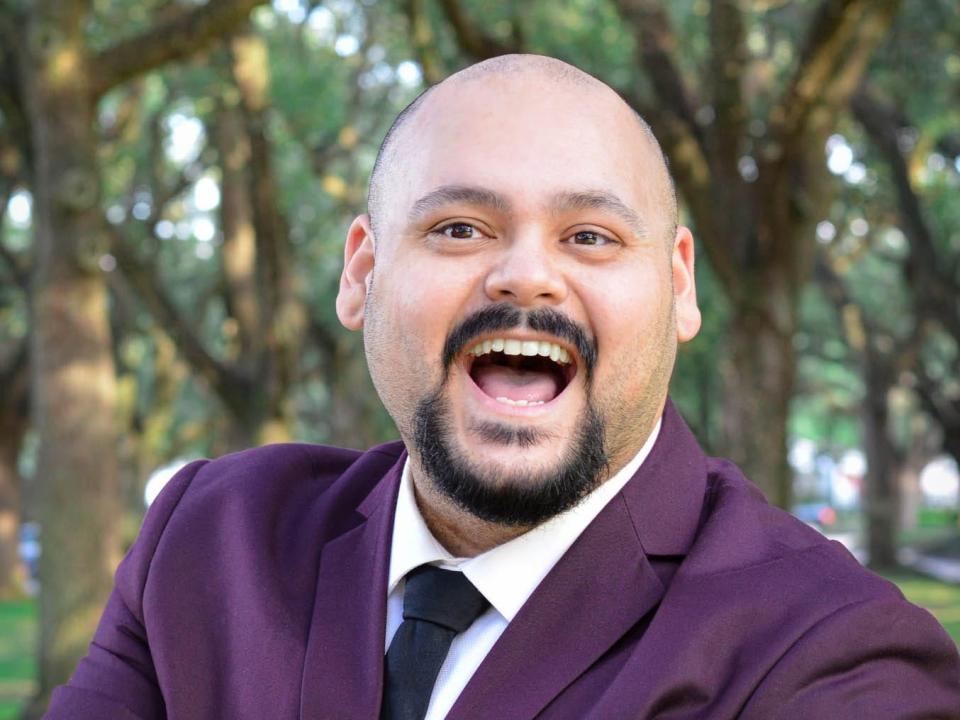I'm a professional opera singer. When I lost my voice because of vocal cord paralysis, I also lost my spirituality and sense of self.
Albert Garcia is a professional opera singer who lost his voice after spinal surgery.
Speech therapy — along with counseling — helped him regain his voice.
His singing voice is now stronger than ever.
This as-told-to essay is based on a conversation with Albert Garcia. The following has been edited for length and clarity.
One night in December 2021, I ordered myself dinner on DoorDash. But when the delivery driver knocked, I couldn't get up. My legs were weak, and I couldn't control the direction I was moving in.
At first, I thought maybe I was dehydrated or hungry. But when the symptoms persisted, I made an appointment with my doctor, who sent me to a specialist. They diagnosed me with a hereditary spinal cord injury and said I had damage throughout my spine. I was only 33, but they said I had the neck of a 70-year-old.
Surgery was my only option to repair the damage. Some of the spinal damage was at the front of my throat, so the surgeon would need to cut into the front of my neck, risking damage to my spinal cords. I had just moved to join the Houston Grand Opera, so I was terrified of damage to my voice. But my neurosurgeon had worked with other singers, and I'm generally an optimist. I knew I had to go ahead with the surgery for my overall health.
After the surgery, I was diagnosed with vocal cord paralysis
I expected about 10 weeks of raspiness after the surgery. But even after that period, my voice didn't return. I sounded airy and weak — a far cry from my robust opera voice. When I tried to sing, I sounded like Winnie the Pooh.
Doctors explained that my vocal cords were paralyzed on the right side. To make sounds and sing, our vocal cords vibrate together, meeting in the middle. With the right side paralyzed, I had no resonance to my voice.
When I heard that diagnosis, I lost it. My whole identity was wrapped up in being a singer. My friends introduced me that way, and my mother gushed about her opera-singing son. Now, I worried I had lost that part of myself forever, and I fell into a deep depression.
At the same time, I started questioning my faith. While I sing opera professionally, singing in the church is my real passion. The same church had taught me that bad things happen to bad people — yet now I was facing this huge challenge for no reason. I was angry and upset that God would take away something that had been so central to my life.
Speech therapy helped me relearn how to use my voice
At first, my team told me to wait, and my vocal function might return. For more than six months I couldn't sing at all—not even at karaoke. In addition to the physical paralyzation, I had an emotional block too. I just wasn't myself.
Since my paralyzation didn't return on its own, the doctor recommended a vocal cord injection. That procedure was the jump start I needed to get my voice back. But what really made the biggest difference was speech therapy. For nine months, I worked with Dr. Marina-Elvira Papangelou, a speech-language pathologist at TIRR Memorial Hermann in Houston. Dr. Papangelou gave me exercises that seemed simple, like humming a certain note or blowing bubbles into a cup with a straw. They felt silly, but made a massive difference in my recovery.
Slowly, as I worked with Dr. Papangelou, a physical therapist and a mental health counselor, my voice, my sense of self, and my spirituality, all returned. I realized I didn't need God to heal me — I had the power within myself. I started taking small steps to make sure I was the best I could be. When I graduated from physical therapy, I celebrated with a 5k. And when I graduated from speech therapy, I serenaded Dr. Papangelou, singing "For Good," a song from the musical "Wicked" that celebrates the impact the characters have had on each other's lives.
My singing voice is stronger than ever
Today, my voice has returned about 90%. While I'm still working on some aspects of my voice, I have a much, much stronger foundation for my future as a singer. Before this, I relied on my natural talent. I didn't need to learn much about the pedagogy of singing, because I had a gift.

Dr. Papangelou changed that. She helped me understand so much more about breath work and vocal skills. During the time I couldn't sing I started my MBA in music management. I have a whole new set of educational experience that will equip me to work in the music industry.
This summer, I joined a community choir. I'm not quite ready for solo work yet, but when I am I know I'll be a better singer because of this experience.
Read the original article on Insider
